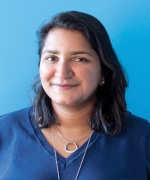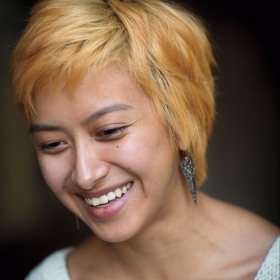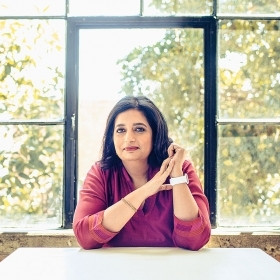When immigration enters the national conversation these days, it tends to fit into one of two narratives. On one side, a Hamilton-style rise to achieve the American dream. On the other, ever-growing fear surrounding the immigrants entering this country and how they will alter the fabric of society.
But the real stories—including those of the many immigrants who have made their way to Wellesley—are more complicated than either of those narratives. They are the stories of broken and repaired families, lost and found histories, plans upended, and constant impermanence. Joyful reunions and deep gratitude. Shifting ground endured to forge new ties and create a home.
Immigrants and international students have been part of Wellesley’s fabric since 1888, when the first international student arrived on campus. Since then, Wellesley has welcomed immigrants whose families fled war and political unrest, like Madeleine Korbel Albright ’59, economic hardship, like Ana Martinez ’17, and horrific tragedy, like Variny Yim ’90. Here are six of their stories.
Ana Martinez ’17
The first time Ana Martinez ’17 crossed the border from Mexico into the United States, she was 3 months old and passing as somebody else’s child. Martinez’s father, who had once lived in the U.S., had met a couple of American citizens and arranged for them to drive her across the border and pretend that she was their own. Meanwhile, Martinez’s actual parents, also undocumented, crossed the border separately and met her on the other side.
The dramatic story is seared into Martinez’s memory as a testament to how desperate her parents must have been to try to reach a better life. Her dad was sick, her mom had lost her managerial job at a pharmaceutical company, and Mexico’s economy was in crisis. They were driven by financial need, Martinez says, but her mother has often looked back and wondered “what exactly went through her mind, because that couple could have taken off with me.”
That border crossing wasn’t an immediate ticket to the American dream they hoped for. After struggling to find work, the family returned to Mexico after a month. They crossed the border again when Martinez was 5, this time together. The family moved to Hollister, Calif., among the cherry and apricot groves, where Martinez learned the No. 1 rule among her community of undocumented immigrants: Be quiet.
“I was used to being really loud, singing terribly back home in Mexico,” she says. But in the U.S., she remembers her parents and other adults in her life “constantly, constantly” telling her to be quiet so as not to draw attention to herself and other immigrants.
So the once-boisterous little girl became nearly silent.
“It’s a very real fear that, I think, you have right away—that you have to be quiet, because [immigration authorities] are going to come and take your parents,” Martinez says.
The quiet followed her on a move to Texas. In elementary school, she stuttered badly, says she was “aggressively shy,” and had trouble learning English.
‘I was not about to be bullied because I was Mexican.’
—Ana Martinez ’17
But she started to find her voice when bullies made fun of her for being a newly arrived “Mexicana”—in contrast to students of Mexican descent whose families had been in the area for generations.
“I was not about to be bullied because I was Mexican,” she says. “I was very, very proud of the fact that I was Mexican, and I always felt more Mexican than I did Texan or American. So I started kind of talking. I started talking back.”
With her parents’ help, she got ahead in school and especially excelled in math. Her father, who didn’t finish high school, practiced multiplication tables with her at home.
“My dad always said that I didn’t have to speak English to be good at math, because … math is its own language, and it’s universal,” she says. Martinez would accompany her mother while she cleaned classrooms in the evening, and she was often given books and puzzles. She became a voracious reader. Eventually, she ended up at Wellesley and became an economics major.
Martinez and her family are now U.S. citizens, and she has most certainly found her voice. Last fall, she interned on Capitol Hill for Rep. Filemon Vela (D-Texas), where she spoke to constituents about their concerns.
And she says she wouldn’t change anything about how she got there. “I generally feel like I have just lucked out in every single way that counts,” Martinez says. “I would never, ever choose to have had any kind of different life.”
Lulu Chow Wang ’66
It was just before the Communist revolution in China when Lulu Chow Wang ’66 visited her father, who was temporarily living in the United States for business. She was 4 years old, and her Wellesley brand of persistence was already shining through. She managed to convince her mother to take her—the third of four children—on the trip. So Wang’s mother set off with her and two older daughters, leaving her youngest child, then 2, behind.
Wang remembers that 1948 airplane ride as “full of wonderment,” not fear. Her father, who was an executive at a private shipping company, greeted the family in Washington, D.C., with an American car, and lived in an American home. All very impressive to a 4-year-old.
Then the revolution happened. Her father had been a well-known Nationalist, and her parents knew they could not return to China. It would be 40 years before her family saw her sister again.
Wang remembers an easy transition to Washington, and eventually New York. In part because she arrived so young, she picked up English quickly, and she loved the leadership and team spirit of sports. She says she “never felt stigmatized as an immigrant.” She is grateful to still speak the Shanghai dialect because of her mother’s insistence that she and her sisters speak it at home after school.
The family made American friends and had a close community of Chinese friends, which Wang describes as the “best of both worlds.”
But there was one member of the family still missing. Wang’s youngest sister was sent to China’s northern provinces to work on a farm and denied upper-school education because of their father’s association with Nationalists. While it was difficult, Wang says being in the countryside actually sheltered her sister from some of the harshest realities of the Cultural Revolution that residents of the country’s urban centers faced. Over the years, the family communicated with her by letter, but there was heavy censorship.
The family—especially Wang’s mother—tried desperately to get a visa for their sister to come to the U.S. In the 1980s, years after President Richard Nixon worked to normalize relations, the family succeeded. Three trips to Shanghai later, Wang’s mother had visas for her youngest daughter, her son-in-law, and their 5-year-old daughter.
Wang feared she wouldn’t feel an instant connection with her sister. “I remember getting ready to go to the airport to welcome my sister to the United States. We were all very excited, but I remember thinking to myself, ‘I’m going to meet my flesh and blood, the sister we’ve wanted to meet all these years, but what if I see her and I don’t feel this automatic sense of love for her?’”
But immediately, when Wang saw her sister, “in her I could see my sister’s hands, my mother’s hair, my laugh, and she was a composite of all of us. … It was like we four sisters had never been apart.”
Wang credits her younger sister’s “generous-spirited positive thinking,” for her family’s joyful reunion. “There was never a word of criticism or blame or whining.”
Her niece, then 5 years old, retraced Wang’s immigration journey to the U.S. and eventually her educational one as well: She grew up to attend Wellesley and graduated in the class of ’97.
Reflecting on her immigrant experience now, Wang is both grateful for the “endless opportunity” her family received by coming to the United States and proud that her family has “brought something new that was additive to the American tapestry.”
Olga Shurchkov ’01
At 14, Olga Shurchkov ’01 wasn’t asked if she wanted to move to the United States from Russia, but she remembers being “psyched.”
Shurchkov’s father was in Russian President Boris Yeltsin’s cabinet, and after political turmoil in the early 1990s, he made a unilateral decision to move his family to the U.S.
Shurchkov’s English was good, and she thought she’d easily fit in with her new classmates. Coming from an interesting, different place, she reasoned, would create opportunity for conversation.
But her transition to the Boston area was “really, really shocking and hard,” she says. She started one school in December and another in March when the family moved to a different Boston suburb. She struggled to fit into a place with different social and cultural norms.
Shurchkov recounts one time she invited classmates over, and her mom asked her what she should cook for them. “A big delicacy in Russia is cow tongue,” she says, so that’s what her mother made. “That was not a good idea,” she says now.
As an immigrant, struggles to integrate socially and find your identity build up, she says, and “kind of kill your confidence.” It’s like trying to penetrate a wall, she says. “You can’t really fit in, and you lose your identity, like you don’t know where you are.”
‘You can’t really fit in, and you lose your identity, like you don’t know where you are.’
—Olga Shurchkov ’01
Shurchkov eventually took back her confidence and broke through that wall with Korean martial arts. She was attracted to the uniformity and discipline of tae kwon do: You don’t really have to speak, everyone wears white, and it’s effort and your attitude that really count, she says.
She has now practiced tae kwon do for more than 20 years and is a fifth-degree black belt. “It’s a place that you can get some kind of identity that’s not related to your immigrant status, you know what I mean? Because at the beginning, you’re just an immigrant.”
“I think that my story would be very different if it weren’t for tae kwon do,” she says.
When Shurchkov was a student, the College became a second home and gave her a fresh start. She’s now an associate professor of economics at Wellesley and says her experience helps her support new generations of international students and immigrants that enter her classroom. “I know how hard it was for me,” she says.
Her parents moved back to Russia while she was in college, and her father has since passed away. But the immigrant experience has very much stayed with—and in some ways divided—her family. Shurchkov now feels more American than Russian, while her mother is decidedly Russian. It’s hard, she says, “to have a deep relationship … when we are from such different world[s].”
Variny Yim ’90
Variny Yim ’90 was just 4 years old when she fled civil war in Cambodia with her sister and grandparents.
By 1973, the family had decided their country wasn’t safe. But, like many emigrants, they thought the situation would stabilize and their leave would be brief. Nobody could have anticipated what would come next for Yim’s family, or her entire country. Between 1975 and 1979, nearly 2 million Cambodians died—roughly 20 percent of the country’s population—at the hands the Khmer Rouge headed by Pol Pot. Hundreds of mass grave sites have been identified, now known as the killing fields.
Yim herself fled with her grandparents before all that happened, joining her mother, who was in the United States on a Fulbright studying linguistics. Her father stayed behind to care for other family members.
Growing up in Virginia, Yim says, it was a daily struggle to balance her identities as a Cambodian and an American. By day, she got the message “loud and clear” at school that it was best to just fit in and try to “make sure that you try to not be so different.” But then she would go home, where “there’s your grandmother speaking [Khmer] to you … telling you to pray to Buddha, reminding you about your father.”
Trying so hard to fit in, she says, suppresses “this very big part of you … and when you’re younger, it seems very confusing.”
Yim’s father back in Cambodia was a looming presence in their house, but her mother didn’t talk about him much. “She was working really hard to make sure that we adjusted to this new life as immigrants,” Yim says.
“It was, I think, such a painful, painful part of my mother’s experience,” Yim adds. “We didn’t even know what was happening to him.”
Yim would never see her dad again. When she was 9 years old, she was told, plainly, that he had died.
“I just remember being called in, and my mom saying, ‘OK, your father has died.’ But I knew nothing about where he was, that he was even in danger. We didn’t even talk about what was happening in Cambodia. … We didn’t discuss it in our house.”
Over the years, she heard several versions of how her father had died. She confirmed the horrific truth as she was researching her family history to inform her 2016 novel The Immigrant Princess. Her father was brutally murdered in Tuol Sleng—a school that had become a torture chamber. Yim also learned that she lost 18 relatives on her father’s side.
Today, her family’s immigrant story is a very present part of her identity, though a part that is not immediately apparent.
“I’m very fortunate because I speak English really well. I am very Americanized,” she says, “and that is [a] complete misperception of immigrants, because I never have lost my identity as an immigrant.”
Growing up in the “shadow of the killing fields,” she says through tears, “not a day goes by when I am not aware of the genocide. And that has been a part of my existence since I was … 9 years old, when I found out my dad died.”
Digging into her family’s past, she says, has helped her look “that darkness in the eye and welcome it, and have it nourish me back.”
Carol Corneilse ’84
Carol Corneilse ’84 remembers what she was wearing the day she realized her quest to fit in on Wellesley’s campus wasn’t working: a yellow crewneck sweater and plaid skirt made by her seamstress mother. “That was the height of the preppy era,” she says.
But she came home from class that day, looked in the mirror and thought, “‘Oh my goodness, this is not who I am.’ … It felt very foreign.”
Corneilse came to Wellesley as an international student from Cape Town, South Africa, where she had grown up middle class during a highly political time. There was widespread institutional racism and activism under the apartheid system. When she was a teenager, tens of thousands of schoolchildren in Soweto walked out to protest the introduction of Afrikaans, seen as the language of apartheid.
Her desire to fit in predated her time at Wellesley. As a multiracial South African, she says she grew up learning that “you straddle both worlds because you fit in neither—because you’re this mix.”
In the U.S., her identity didn’t fit neatly into a box, either. She is South African, but her last name sounds European. Classmates were confused that she looked Asian but identified as black.
And there was what she calls “shared cultural capital” among Americans that she just didn’t have. She hadn’t heard of the TV show Gilligan’s Island and was shocked to see classmates write with pen in textbooks. That was unheard of where she grew up, because books were passed on to the next class.
As an international student, she also found it difficult to connect with black students at Wellesley because she is not African-American. Years later, though, many of her classmates have shared that they, too, felt left out, for other reasons. “As alums,” she says, “you realize you had more in common with each other as undergraduates than you thought you did.”
It took her about two years to feel comfortable in her own skin on campus. “I did try to fit in,” she says, “but I reached a point where I was comfortable being different, and I didn’t feel like I had to be someone else.”
“I made a space for myself being who I was, and I found my sweet spot, and after that I was OK.”
Since Wellesley, Corneilse has moved back and forth between the U.S. and South Africa. She is now a green card holder and lives with her family in the Washington, D.C., area, where she is a professor. She says she is at home in such a political, diverse, and international city. But she feels at home in South Africa, too. “I see myself as a citizen of the world,” she says. “I don’t see myself as being purely South African or purely American … I feel completely comfortable in both environments.”
Madeleine Korbel Albright ’59
Madeleine Korbel Albright ’59 remembers sailing into New York Harbor when she was 11, full of deep appreciation and anticipation for what the United States would offer.
It was November, and it had been a long journey from England. Still, she says, it “really was a spectacular time to come in to New York harbor and see the Statue of Liberty that we had all read about, and think about what it really meant that we were coming to this incredible country.”
Her father, Josef Korbel, was a diplomat who was forced out when communists took over Czechoslovakia.
Albright had watched politics and history unfold during World War II, with a keen eye on America’s crucial role in the war.
The family had already moved from Czechoslovakia to England, and then settled in Great Neck, N.Y. She had the major advantage of already speaking English, she says, but she remembers wanting to fit in socially, too.
She recalls gathering with family to sing “We Gather Together” before Thanksgiving and hearing somebody “osking” for God’s blessing. “I thought, who’s ‘osking?’” she recalls. “From then on I ‘asked’ because I wanted to fit in.”
And the family had to sort out how America worked in other ways. Her mother got into soap operas, thinking they would have an ending—of course, they never did. And they’d never heard of allergies. “So finally, when one of us … got an allergy, my father said, ‘Now you’re an American.’”
But generally, she says, the family was “just happy to be together in America.”
We were basically refugees, and people lent us things [as] we lived in a variety of rented houses, in apartments, moving around.
—Madeleine Korbel Albright ’59
The family soon packed up and drove to Denver, where her father got a job. There weren’t a lot of foreigners, she remembers, but there “was a great generosity and openness.”
“We were basically refugees,” Albright says, “and people lent us things [as] we lived in a variety of rented houses, in apartments, moving around.”
But despite the impermanence of her situation, she always felt at home in the United States. “The brilliance of my parents was that they made the abnormal seem normal,” she says. “I always grew up with a sense of what America had to offer, and my father used to say regularly, ‘There is nothing better than being a professor in a free country.’”
“We were all delighted to be in the United States, and so I kind of grew up … so grateful to be an American, and to be taken in, frankly,” she says.
Albright, who went on to serve as the first female U.S. secretary of state, hopes America’s exceptional openness to immigrants and refugees will remain. Her father used to say that when the family was in Europe, people would express sympathy for his situation and ask when the family was planning to return to Czechoslovakia. In America, she says, people asked when they would become citizens.
 Amita Parashar Kelly ’06 is an editor on NPR’s national desk and the daughter of immigrants.
Amita Parashar Kelly ’06 is an editor on NPR’s national desk and the daughter of immigrants.









We ask that those who engage in Wellesley magazine's online community act with honesty, integrity, and respect. (Remember the honor code, alums?) We reserve the right to remove comments by impersonators or comments that are not civil and relevant to the subject at hand. By posting here, you are permitting Wellesley magazine to edit and republish your comment in all media. Please remember that all posts are public.